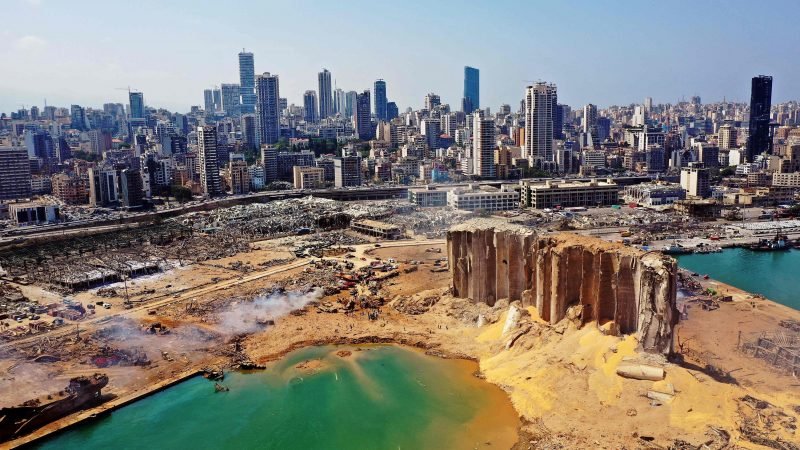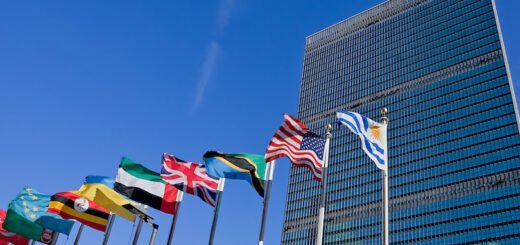Beirut Blasts – Deep-rooted causes and far-reaching effects

On August 4, two blasts took place in Beirut, the capital city of Lebanon. These blasts took place in the port area of the city. More than 160 people have died and more than 5000 people have been injured as a result of the powerful explosions. The damaged caused to the property in Beirut has rendered around 300000 people homeless at least temporarily.
According to the Lebanese government, these blasts were caused because of the explosion of more than 2700 tonnes of ammonium nitrate that was stored in a warehouse for more than six years. This chemical was also said to be stored in an improper manner.
Following the blasts, Prime Minister Hassan Diab announced his resignation and that of his government on August 10. There have been protests in Lebanon against the government and the protesters have been demanding political reforms in the country.
Negligence and corruption are considered to be the principal reasons for this tragedy. However, it is important to take into account that these blasts must not be looked at as an isolated incident or an accident. This incident is a result of problems that have piled up over the decades. It is, therefore, necessary to consider the current problems, their causes and what possible effects these would have for Lebanon in future at international level.

Current challenges
The blasts in Beirut are considered to be a result of years of problems that have accumulated owing to instability existing in the country. The blasts are blamed on the misgovernance rather than just an accident. Political instability, corruption and economic problems are the principal challenges that Lebanon is facing currently. The recent incident is the collective outcome of all these challenges.
Political instability is the greatest challenge for Lebanon since past few decades. The ammonium nitrate was stored since 2014 in the port area of Beirut. From 2014 to 2020 Lebanon has seen three prime ministers. Hassan Diab, who resigned recently, had become the prime minister only in January 2020. Political instability has, in turn, led to corruption and thereby economic crisis.
According to Transparency International, Lebanon ranks at 137 out of 198 countries and it scores 28 out of 100 in terms of parameters for clean governance. The score of 28 indicates a high level of corruption and makes Lebanon one of the most corrupt countries in the world.
In addition to corruption, Lebanon is suffering from a severe economic crisis. The economic crises range from shortage of electricity to inflation to food shortage and restrictions on bank transactions. Recently Lebanon has become the first country in the Middle East and North Africa to suffer from hyperinflation. Hyperinflation occurs when inflation increases at the rate of 50% per month over a period of time.
What are the reasons for instability?
Lebanon had been a thriving economy in the 1960s to mid-1970s. It has also been one of the most educated and industrialized countries in the Middle East with highly developed financial and service sector.
However civil war from 1975 to 1990 has been responsible for most of the problems that Lebanon faces today. Sectarian strife and regional geopolitics have brought instability in Lebanon. Lebanon has been a multicultural and multireligious society. The several denominations in the Lebanese society are Sunni Muslims, Shia Muslims, Maronite Catholic Christians, Greek Orthodox Christians and Druze. In order to balance the aspirations of all the communities, a National Pact was proposed in 1943 which distributed different power centres such as the posts of the president, prime minister, deputy prime minister, speaker of the parliament etc. among these denominations.
Lebanon had been a Christian-majority country. But through the 1960s and 1970s, the population of Christians has decreased and the Muslim population increased. The influx of Palestinian refugees also led to increased radicalization and disturbance. There were confrontations between different sects of Lebanon. Besides, Israel also attacked Lebanon in the 1970s and 1980s in order to target the Palestinians. Along with these developments, the rise of Shia militant group Hezbollah in Lebanon’s politics further led to the unstable sectarian structure.
Peace and stability have been fragile in Lebanon. But the Beirut blasts and the aftermath is likely to push Lebanon into an uncertain future.

International perspective
Decades of violence and economic mismanagement has resulted in people of Lebanon losing faith in their own government. This was strongly demonstrated after the Beirut blasts.
Two days after the blast, French President Emmanuel Macron visited Beirut. He was the first foreign leader to visit Lebanon after this incident. Macron’s visit stirred up the atmosphere in Lebanon. People cheered for Macron as he walked on the streets of Beirut. There was a sense of expectation in people from Macron and France. People shared their grievances with Macron. Macron on his party promised the people of Lebanon that he would press the Lebanese government for political reforms. During Macron’s visit to Beirut, over 55,000 people signed a petition requesting France to take control of Lebanon. Lebanon was previously a French colony and became independent in 1943. During this visit, Macron said that he would return to Lebanon on September 1 to review the progress.
The French president also called for an international conference which was held on August 9. An amount of €250 million was raised at the conference to support Lebanon. But the donors said that political reforms would be the pre-condition for aid.

The Beirut blasts have led to crumbling of the political system in Lebanon. Urgent political reforms and revival of the political-institutional mechanism are necessary. Restoring people’s confidence in their own government is important although it seems a difficult task. The disruption caused to the political and economic systems has led to a drop in people’s morale and the damaged their sense of national pride. People preferring colonial rule over independence is testimony to that.
The resignation of the entire government would only further complicate the situation. Lebanon could face severe civil unrest if not a civil war. Another possibility is that of Hezbollah trying to gain control of the country. If that happens it could lead to two scenarios. Iran’s influence would increase which could lead Israel to target Hezbollah in Lebanon. Secondly, Lebanon could become one of the focal points of rivalry between Shia Iran and Sunni Arab countries. Increasing international interference in Lebanon in the absence of a strong government could turn its situation similar to that of neighbouring Syria.
The situation in Lebanon has built up over decades of serious problems that were never addressed. In a way, it was a bomb that was waiting to explode. However, it is necessary for the people of Lebanon to push for political reforms instead of looking for foreign help. Foreign countries and international agencies also need to restrict their role in reconstruction and development. These blasts should be an opportunity to address the deep-rooted causes that were plaguing Lebanon for decades.



















